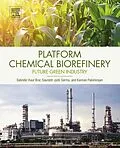Platform Chemical Biorefinery: Future Green Chemistry provides information on three different aspects of platform chemical biorefinery. The book first presents a basic introduction to the industry beneficial for university students, then provides engineering details of existing or potential platform chemical biorefinery processes helpful to technical staff of biorefineries. Finally, the book presents a critical review of the entire platform chemical biorefinery process, including extensive global biorefinery practices and their potential environmental and market-related consequences. Platform chemicals are building blocks of different valuable chemicals. The book evaluates the possibility of renewable feedstock-based platform chemical production and the fundamental challenges associated with this objective. Thus, the book is a useful reference for both academic readers and industry technical workers. The book guides the research community working in the field of platform chemical biorefinery to develop new pathways and technologies in combination with their market value and desirability. - Offers comprehensive coverage of platform chemicals biorefineries, recent advances and technology developments, potential issues for preventing commercialization, and solutions - Discusses existing technologies for platform chemicals production, highlighting benefits as well their possible adverse effects on the environment and food security - Includes a global market analysis of platform chemicals and outlines industry opportunities - Serves as a useful reference for both academic readers and industry technical workers
Autorentext
Dr. S. K. Brar is Professor in Environmental Engineering. She holds Master's Degrees in Organic Chemistry and in Technology in Environmental Sciences and Engineering, and a Ph.D. in Environmental Biotechnology. Her research interests lie in bioprocesses and the valorization of residues (agricultural; agro-industrial; industrial and municipal) into high value-bioproducts, such as enzymes, organic acids, platform chemicals, biocontrol agents, biopesticides, butanol and biohydrogen. She is also interested in the fate of emerging contaminants during value-addition of wastewater and wastewater sludge in turn finding suitable biological detoxification technologies. In 2014, Dr. S. K. Brar was elected as a member of The College of New Scholars, Artists and Scientists of the Royal Society of Canada in recognition for outstanding performance in her field of environmental biotechnology. She has more than 300 research publications, including: five books, 56 chapters, 230 original research papers, 60 research communications in conferences and has registered 2 patents to her credit.
Klappentext
Platform Chemical Biorefinery: Future Green Chemistry provides information on three different aspects of platform chemical biorefinery. The book first presents a basic introduction to the industry beneficial for university students, then provides engineering details of existing or potential platform chemical biorefinery processes helpful to technical staff of biorefineries. Finally, the book presents a critical review of the entire platform chemical biorefinery process, including extensive global biorefinery practices and their potential environmental and market-related consequences.
Platform chemicals are building blocks of different valuable chemicals. The book evaluates the possibility of renewable feedstock-based platform chemical production and the fundamental challenges associated with this objective. Thus, the book is a useful reference for both academic readers and industry technical workers. The book guides the research community working in the field of platform chemical biorefinery to develop new pathways and technologies in combination with their market value and desirability.
- Offers comprehensive coverage of platform chemicals biorefineries, recent advances and technology developments, potential issues for preventing commercialization, and solutions
- Discusses existing technologies for platform chemicals production, highlighting benefits as well their possible adverse effects on the environment and food security
- Includes a global market analysis of platform chemicals and outlines industry opportunities
- Serves as a useful reference for both academic readers and industry technical workers
Inhalt
1. Platform chemicals- significance and need
2. Biorefinery- general overview
3. Petroleum versus biorefinery based platform chemicals
4. Life cycle analysis of potential substrates of sustainable biorefinery
5. Propylene glycol - an industrially important C3 platform chemical
6. 3-hydroxypropanoic acid production from renewable resources and its commercial significance
7. Butyric acid - a platform chemical for biofuel and high value biochemicals
8. Fumaric acid - biotechnological production of the platform chemical by Rhizopus oryzae
9. Malic and succinic acid - potential C4 platform chemicals for polymer and biodegradable plastic production
10. Potential application of renewable itaconic acid for the synthesis of 3-methyltetrahydrofuran
11. Production of renewable C5 platform chemicals and potential applications
12. Sorbitol production from biomass and its global market
13. Sugar derived industrially important C6 platform chemicals
14. Production of drop in and novel bio-based platform chemicals
15. Platform chemicals and pharmaceutical industries
16. Biorefinery and possible deforestation
17. Biorefinery and possible negative impact on food market
18. Algal biorefinery for high value platform chemicals
19. Animal fat and vegetable oil based platform chemical biorefinery
20. Platform chemical biorefinery and agro-industrial waste management
21. Integrated biorefinery for food, feed and platform chemicals
22. Integrated biorefinery for bioenergy and platform chemicals
23. Microbiology of platform chemical biorefinery and metabolic engineering
24. Enzymes in platform chemical biorefinery
25. Process design and optimization for platform chemical biorefinery
26. Case studies on industrial production of renewable platform chemicals
